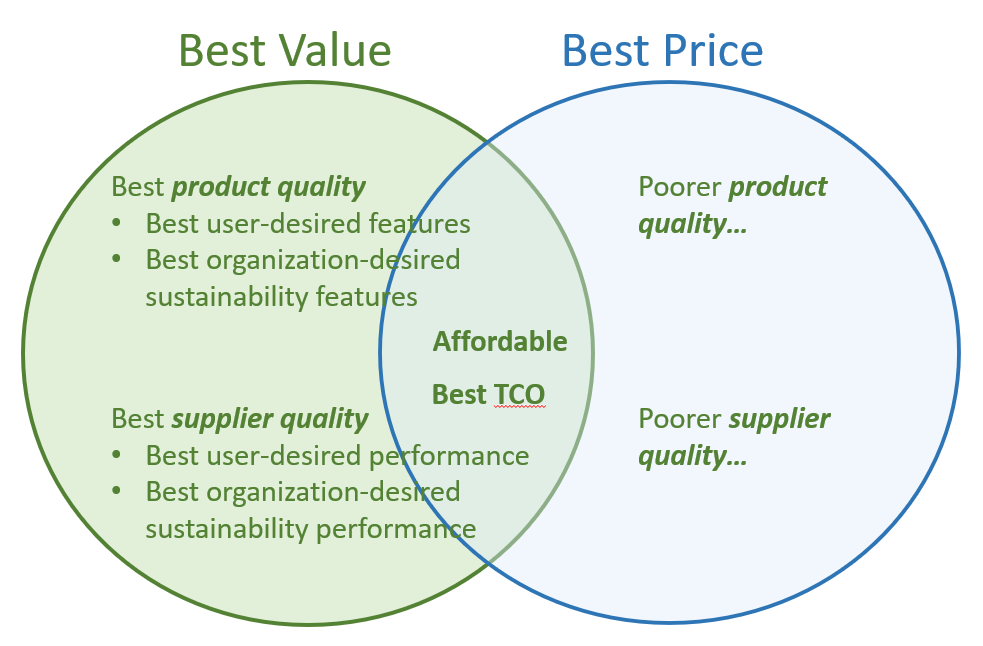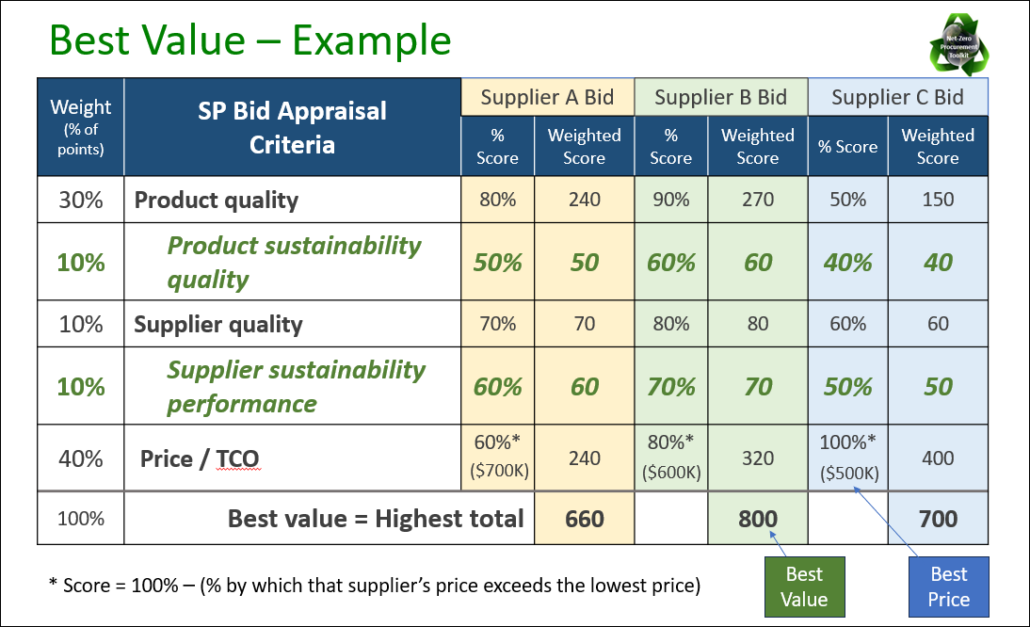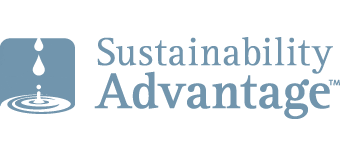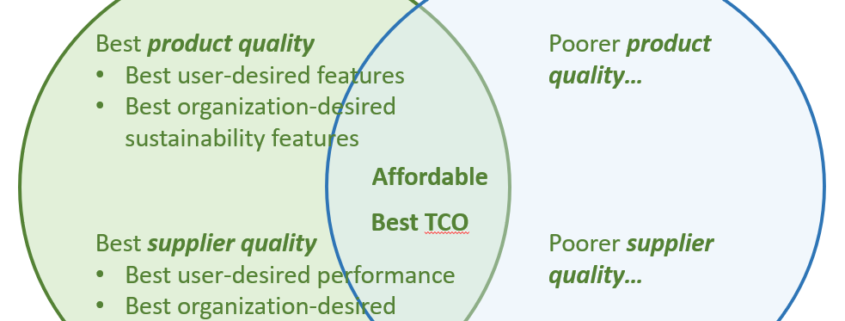Best Value vs Best Price

The definition of Sustainable Procurement is obtaining best value for money by purchasing the most sustainable goods and services from the most sustainable suppliers, in support of the buyer’s purpose, policies, and strategic sustainability goals. “Best value” has always considered product quality, supplier quality, and short- and long-term cash flow implications of purchasing decisions, as well as price. It is synonymous with “best deal” – highest quality for the money. In the 21st century, companies are mutually accountable for the impacts of suppliers and their products on people and planet. That’s why organizations now recognize that supplier and product sustainability-related attributes also contribute to their quality.
The user / client department just wants a good, high-performing, durable product that satisfies their needs. In addition, the organization may have overarching sustainability strategies, goals, and targets that also need to be reflected in product and supplier specifications. For example, the organization may have a goal of reducing its greenhouse gas (GHG) emissions in line with science-based targets. That goal includes GHG emissions embodied in the products they buy and emissions from their upstream suppliers. Therefore, buyers add “organization-desired” low-carbon attributes of products and suppliers to “user-desired” performance attributes to determine overall product and supplier quality, as illustrated in the above figure.
For example, when purchasing a fleet of electric vehicles (EVs), specifications in the Request for Proposal (RFP) might include these criteria to ensure obtaining best value for that acquisition.
Product Quality – User-desired features
These are product attributes that the user / client department needs to meet its functional and performance requirements. For EVs, typical user-desired specifications might include: range per charge; charging speeds; battery life warranty; performance and handling metrics; exterior styling; cargo space; comfort and interior ergonomics; instrumentation and dashboard layout; safety ratings; ride comfort; infotainment systems; and telematics for fleet management.
Product Quality – Organization-desired sustainability features
These product attributes align with organization / company priorities, policies, and strategic sustainability goals. For organizations committed to improving their direct and indirect environmental and social impacts, sustainability-related EV attributes might include the carbon footprint of the EV; percentage of recyclable, recycled, or biodegradable materials in the EV; ethically sourced components and materials; end-of-life recyclability of the battery and other components; availability of a trade-in option; availability of a lease option or refurbished models; and greenhouse gases (GHGs) from shipping / delivery.
Supplier Quality – User-desired performance
User / client departments want to deal with suppliers who deliver on their commitments. For EVs, supplier related attributes might include production capacity; delivery timelines; warranty terms for critical components; availability of parts and service; track record and testimonials; financial health and longevity in the market; and capacity to deliver additional quantities.
Supplier Quality – Organization-desired sustainability performance
These supplier performance attributes align with organization / company priorities, policies, and strategic sustainability goals. For organizations committed to improving their direct and indirect environmental and social affects, supplier sustainability performance attributes might include commitment to reducing GHGs in line with science-based targets; commitment to circular design; supplier’s operational affects on people and planet; and supplier due diligence on human rights and environmental affects in their supply chains;
Affordability
Of course, the acquisition must fit within the user’s / client’s available budget. The budgeted funds should allow for the purchase of higher quality product from a higher quality supplier.
Best Total Cost of Ownership (TCO)
TCO calculations help determine if initially paying more for goods and services is the best long-term financial decision. A TCO for a fleet of EVs would consider all ongoing direct and indirect costs and benefits associated with the operation of the vehicles over time, including factors like these:
- Purchase price: Initial cost per vehicle and discounts for bulk purchases.
- Financing options: Availability of lease vs. purchase options and financing terms.
- Government incentives: Rebates on EVs and charging infrastructure for fleet operators.
- Operational costs: Estimated recharging costs and maintenance expenses.
- Charging infrastructure costs: Initial investment and any ongoing costs for charging stations.
- Residual value: Expected vehicle resale or trade-in value after a specific time horizon.
- Utilization rates: Expected vehicle usage to optimize cost efficiency.
When comparing TCO calculations for various bids, the net-present value (NPV) of future cash flows related to the purchase is a useful metric. The free, open-source Sustainable Procurement Toolkit includes a TCO Calculator that automatically calculates the NPV of projected cash flows.
A Bid Appraisal Template takes all the above factors into account. The Sustainable Procurement Toolkit includes a sample weighted appraisal of three bids, below. It shows how all the above contributors to best value are factored into the appraisal of three competing bids from Supplier A, Supplier B, and Supplier C. The suppliers’ score on each line item factors the points associated with that line item (i.e., its weight) to generate the supplier’s weighted score on each line item. The supplier’s bid with the highest total weighted score is the best value.

Procurement professionals have always taken pride in negotiating the best possible deal for new acquisitions. They should continue to do so. In the 21st century, the only difference is that sustainability-related attributes are important factors when assessing product and supplier quality and are significantly weighted factors in bid appraisals. The best deal is still getting the highest quality for the money.
For blog subscribers, please click here to visit my site and provide feedback. Slides of the figures used in this blog will be included in the next quarterly update to my Master Slide Decks, to which anyone can subscribe.




